|
|
|
Sort Order |
|
|
|
Items / Page
|
|
|
|
|
|
|
| Srl | Item |
| 1 |
ID:
112534
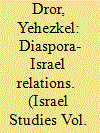

|
|
|
| 2 |
ID:
112536
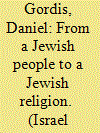

|
|
|
|
|
| Publication |
2012.
|
| Summary/Abstract |
Professor Gabriel Sheffer is correct in asserting that relations between Israel and Diaspora Jews are more fraught than they have been in a long time, and that according to some measures, American Jewish support for Israel may be on the decline. Such support, of course, is difficult to measure, and in many respects, American Jewish support for Israel remains strong. We are, without a doubt, living in a period of significantly shifting sands, and we are in Sheffer's debt for not only pointing to it, but for suggesting some of its causes.
|
|
|
|
|
|
|
|
|
|
|
|
|
|
|
|
| 3 |
ID:
112539
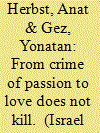

|
|
|
|
|
| Publication |
2012.
|
| Summary/Abstract |
This study examines the actions of the Na'amat women's organization and its allies in Israel, vis-à-vis the court and the press, in the legal-feminist struggle to fight violence against women. Using the 1991 murder of Einav Rogel by her ex-boyfriend Gilad Shemen as a case study, we argue that, in the public debate following the murder, Na'amat and its associates helped to overturn a prevalent press narrative. Specifically, their campaign tackled misleading press representations, such as use of the term "crime of passion". This accomplishment is framed within concerted efforts, since the 1970s, to turn the issue of violence against women into a comprehensive public problem that requires special attention by authorities.
|
|
|
|
|
|
|
|
|
|
|
|
|
|
|
|
| 4 |
ID:
112533
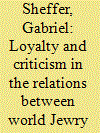

|
|
|
|
|
| Publication |
2012.
|
| Summary/Abstract |
Loyalty to Israel and criticism of it by the World Jewry is an important issue, and is more complex than usually thought. This issue is not limited to public or secretive statements of harsh or mild criticism of Israeli governments and their policies. Loyalty and criticism are closely linked to many aspects of events and changes taking place in the Diaspora and in Israel. In this context, there is no doubt that Diaspora Jews and Jews from Israel are now experiencing fundamental and significant changes and face basic problems which affect mutual loyalty and criticism between Diaspora Jews and Israelis. Since the origins and nature of these changes which affect loyalty and criticism is complex, these must be thoroughly examined. Below is a brief discussion of these changes followed by an analysis of their impact on loyalty and criticism in the current relations between World Jewry and Israel.
|
|
|
|
|
|
|
|
|
|
|
|
|
|
|
|
| 5 |
ID:
112535


|
|
|
|
|
| Publication |
2012.
|
| Summary/Abstract |
The relationship of Diaspora Jewry to Israel has been the focus of intense, sometimes bitter debate, both before and after the establishment of the State of Israel.1 The creation of Israel in the shadow of the Holocaust and the "ingathering" of Jews from around the world in its first decade muted critical voices, even those who had been ambivalent.2 In the early years of the state, what began as harsh rhetoric about shlilat ha'golah (negation of the Diaspora) and the impossibility of full Jewish life outside of Israel, moderated and Diaspora Jews learned to love Israel, without feeling guilty about not making aliya. In particular among American Jews, perhaps the most settled Jewish Diasporans, Israel became a focus of extraordinary pride. The 1967 Six Day War was an exceptional moment that promoted solidarity. Since then, levels of support and engagement with Israel have remained consistently high, although there are some perturbations in levels of support associated with periods of heightened hostility or threats to Israel.3 Despite Gabriel Sheffer's claims about current Diaspora-Israel relations, attitudes toward Israel among Diaspora Jewry remain extremely positive. American Jews in particular are highly attached to Israel and there is little indication that recent political debates have changed the fundamental picture.
|
|
|
|
|
|
|
|
|
|
|
|
|
|
|
|
| 6 |
ID:
112531


|
|
|
|
|
| Publication |
2012.
|
| Summary/Abstract |
On a beautiful Mediterranean coast, in the newly-established state of Israel, one way of life violently and abruptly ended and a new one began, when the inhabitants of Tantura squarely faced the war on 22-23 May 1948 for a brief period of 25 days-from the Jewish occupation of the village, the arrest of the men and the expulsion to Furaydis of the rest of the population, via the second expulsion to Jordan, to the settlement of Kibbutz Nachsholim. How did this happen exactly? Why did the Jews act as they did, and how did they construct their cultural world and mental horizons? And how are we to tell this story?
|
|
|
|
|
|
|
|
|
|
|
|
|
|
|
|
| 7 |
ID:
112537


|
|
|
| 8 |
ID:
112538
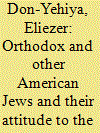

|
|
|
|
|
| Publication |
2012.
|
| Summary/Abstract |
The central argument of Professor Gabi Sheffer in his interesting essay is that since the 1973 war American Jewry has experienced "a gradual process of decreasing loyalty to Israel and increasing criticism of it." He relates this process to two main factors. One of them is the growing integration of American Jews in their surrounding society and the other is the weakening of their Jewish identity.
|
|
|
|
|
|
|
|
|
|
|
|
|
|
|
|
| 9 |
ID:
112532
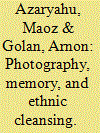

|
|
|
|
|
| Publication |
2012.
|
| Summary/Abstract |
Much of the recent academic literature on the 1948 war portray it a one-sided-and thus simplistic-ethnic cleansing of the Arab population of Palestine. Referred to as the Naqba paradigm, it features the Jews/Zionists as villainous perpetrators and the Palestinian Arabs as feeble victims. Accordingly, the story of "the 1948 Ethnic Cleansing of Palestine" excludes expulsion and massacres of Jews, the destruction of Jewish communities, and the erasure of the Jewish signifiers in the local landscape from the story. As made explicit in John Phillips' photo-reportage featuring the destruction of the Jewish Quarter of the Old City of Jerusalem, the ethnic cleansing of Palestine also involved the expulsion of Jews and the destruction of their communities-whenever and wherever military power relations were in favor of Arab forces.
|
|
|
|
|
|
|
|
|
|
|
|
|
|
|
|
| 10 |
ID:
112530


|
|
|
|
|
| Publication |
2012.
|
| Summary/Abstract |
Yehuda Amichai is one of the twentieth century's (and Israel's) leading poets. Historically, Amichai belongs to the group of writers who founded "Israeli literature" in the 1950s and early '60s, and were dubbed the "Generation of the State" because they were the first authors to publish in the State of Israel after it was established. Amichai and his peers rebelled against their predecessors' grandiose, ideological verse and proclaimed that "understatement" and individualism would be two of their guiding principles. While doing research for my book, Yehuda Amichai: The Making of Israel's National Poet (UPNE, 2008), I discovered 100 love letters that Amichai sent from Haifa to New York during 1947-1948. These are both a literary account and a historical testimony of great value. Amichai's portraits of Haifa during those months have never been discussed. In this article, I describe the way the letters bring to life Haifa's magnificent landscapes and the struggle of the Jewish city from Amichai's unique point of view.
|
|
|
|
|
|
|
|
|
|
|
|
|
|
|
|
| 11 |
ID:
112540


|
|
|
|
|
| Publication |
2012.
|
| Summary/Abstract |
Israel's "New History" has itself become history. What in the late 1980s and 1990s appeared to be shocking revelations about Israeli policy in 1948 have become anodyne. In Israeli academia, many of the New Historians' arguments have become mainstream, as they have been debated, examined, and found to be by and large accurate. What is more, the New Historians' findings now spur little controversy in Israeli society as a whole. Some Israelis outside of academia have developed a more critical approach to their country's past, but many more have responded to the nearly constant Israeli-Arab strife of the past decade by forming a jaundiced view of the country's historical record and justifying Israeli aggression and brutality as unfortunate but necessary measures in an endless war against an unappeasable foe. Thus recent revisionist accounts of the 1967 war have received far less press and been far less controversial than their predecessors on 1948 and 1956. So what, Israelis may ask, if, as Tom Segev's massive tome on 1967 argues, Israel hankered for war in order to pull the country out of the funk induced by the 1966 recession?1
|
|
|
|
|
|
|
|
|
|
|
|
|
|
|
|
|
|
|
|
|